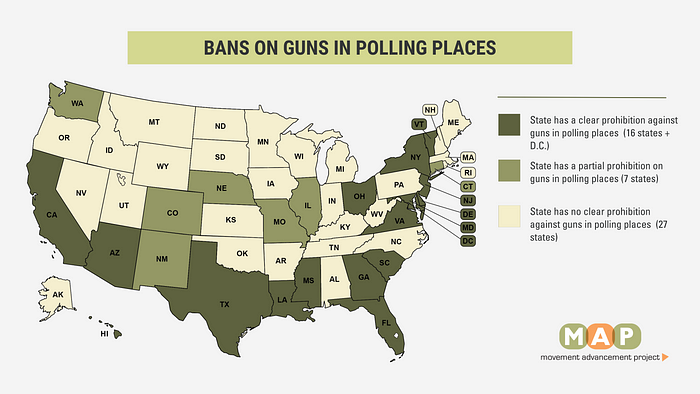Democracy Maps
Democracy Maps Updates: June 2024

In recognition of National Gun Violence Awareness Day, MAP is joining the call to end gun violence and supporting the Wear Orange campaign. We honor the communities shattered by gun violence and together, we call for meaningful action to save lives.
Every day, more than 120 people in America are killed with guns. The gun homicide rate in the U.S. is 26 times higher than that of other developed countries, but research shows that common-sense public safety laws can reduce gun violence and save lives. Prohibiting guns at polling places is one of these common-sense public safety laws, particularly during such a politically divisive year that is plagued with threats of harassment and violence.
Guns at polling places, even if not used to commit violence, can be used to intimidate voters and election officials, as evidenced by our country’s long and fraught history of political violence, often targeted at Black voters and other historically disenfranchised groups. Combined with the marked rise in threats to election officials and violent rhetoric around elections, the proliferation of firearms in our country represents an increasing danger for everyone participating in the voting process.
There is currently no federal law prohibiting the possession of firearms in polling places, and therefore these policy decisions are left to the states. MAP has updated our resources to more fully represent the policy landscape of bans on guns in polling places, to include partial bans that have exceptions for concealed or open carry of firearms.

Since 2020, 11 states have enacted full (7 states) or partial (4) bans on the possession of guns in polling places, joining 12 other states and D.C. that already had such bans in place. As a result, a total of 23 states and D.C. now have total (17) or partial (7) bans on the possession of guns in polling places, covering 64% of eligible voters.
Like protections for election officials, laws banning guns from polling places represent a crucial bulwark against the rise of intimidation and violence that has inundated our political process since 2020. To maintain secure and peaceful elections, both election officials and voters should be safe from violence when participating in our democracy.
MAP’s newest project, the Democracy Maps, tracks more than 50 laws and policies related to elections and voting. Our maps are updated in real time as legislatures across the country pass laws that impact voting, elections, and our democracy.
These are the Democracy Maps updates as of June 7, 2024.
▸▸ State Policy Updates
Bans on Guns in Polling Places
At the end of May, Vermont became the latest state to adopt a total ban on guns in polling places, joining 22 other states and D.C. with total or partial bans. Along with New Mexico, Vermont is the second state this year to pass such a ban. As a result, 64% of eligible voters now live in states with total or partial bans on guns in polling places. This policy is an example of changes that can still be made by lawmakers in an election year to protect voters and election officials, as well as ensuring our democratic process is safe from threats and violence.
State Voting Rights Acts
Minnesota became the latest state to enact a state level voting rights act in May, joining seven other states with such laws. The legislation makes Minnesota the first state to respond to the 8th Circuit’s opinion which eliminated the private right of action under the federal VRA. The Minnesota Voting Rights Act’s provisions include: prohibitions against voter suppression, vote dilution, and instructions for state judges to interpret election laws in a pro-voter way whenever reasonably possible. With voters no longer able to count on the critical provisions of the federal VRA, these state level protections are critical to fill this gap and combat racial discrimination in voting and elections.
These policies work by requiring local jurisdictions to receive permission from state authorities before changing voting procedures, and by prohibiting racial discrimination in election administration.
▸▸ More from Democracy Maps
You can stay connected with Democracy Maps by subscribing to our newsletter and following our work via social media on:

